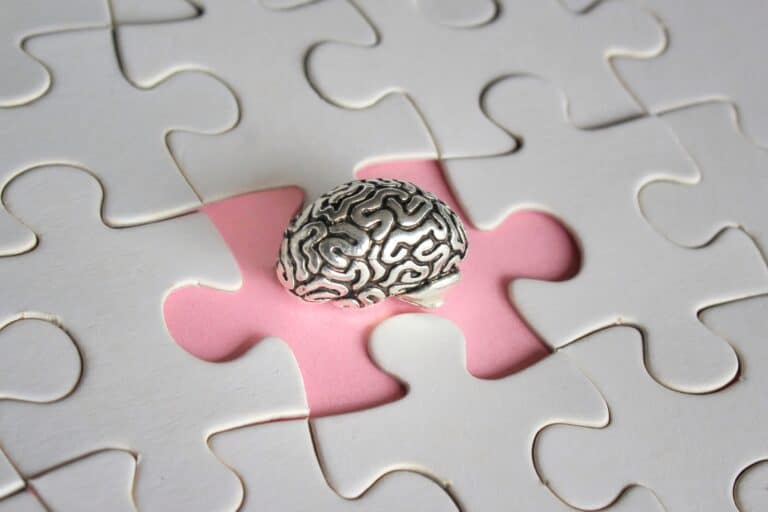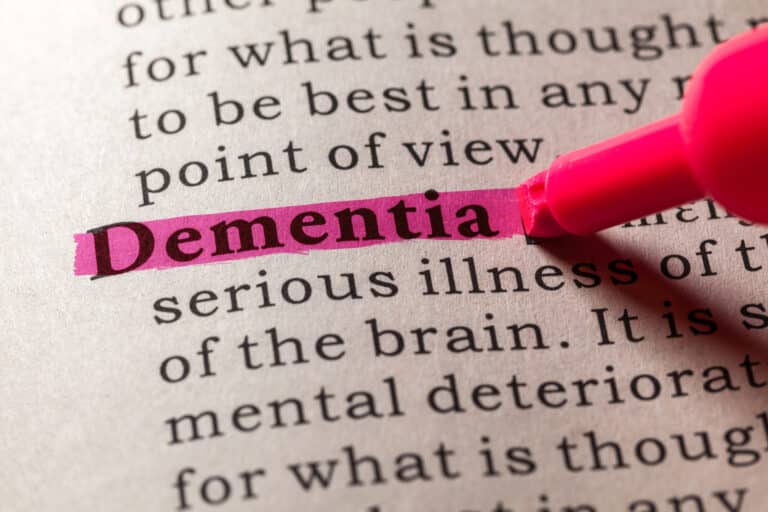Cognitive health is key to a well-balanced life for any older adult. While many often feel that they can only influence their physical health, there are several ways that older adults can support and maintain their cognitive health in daily life.
Keep reading to learn more about the value of cognitive health for seniors, how to recognize cognitive decline, and cognitive health solutions so you can maintain your cognitive health for the long haul.
Table of Contents
- What is Cognitive Health?
- The Value of Cognitive Health for Older Adults
- Causes and Risk Factors for Poor Cognitive Health in The Elderly
- Signs and Symptoms of Declining Cognitive Function in Older Adults
- Medical Diagnosis and Treatment Options
- Prevention Tips for Maintaining Good Cognitive Health
- Key Takeaways
- FAQs
What is Cognitive Health?
Cognition is retaining and understanding information for proper awareness, judgment, and reason. It is essential for normal brain function.
Experts at the National Institute on Aging define cognitive health as the continued ability to think, learn, and remember clearly through every stage of your lifespan.1
Regardless, some decline in ability is a natural part of aging that can occur at different rates for each individual.
The Value of Cognitive Health for Older Adults

Elements of cognitive health are essential for daily tasks, maintaining relationships with others, and caring for yourself. Healthy cognitive function helps older adults live happy, safe, and fulfilling lives.
It’s important to know that cognitive health is just one part of brain health, alongside motor control, sensation, and emotional processing.1
In many cases, different aspects of brain health can influence one another — taking steps to support each of these components in your daily life is very important.
Because certain chronic conditions (such as Alzheimer’s disease) or brain injuries can cause problems with other components of overall brain health, older adults may not always be able to influence the outcome of their cognitive decline.2
However, you can include many lifestyle habits that may make a difference in keeping your brain healthy to maintain — or even improve cognitive health.
Causes and Risk Factors for Poor Cognitive Health in The Elderly

Several factors, including natural cognitive decline or traumatic life events, can cause poor mental health.
Like other body systems (and our general physical health), cognition naturally declines with age. In many cases, this is not related to a specific health condition but overall changes in the body’s general function, including the speed and ability of nerves to send and receive signals.3
As an extension of the human brain, the nervous system becomes less efficient with age. So does our ability to learn, process, and remember information. This is often described as memory loss.
The Role of Brain Trauma in Cognitive Health
Traumatic events like stroke or brain injury can also impact cognitive health.
A stroke occurs when blood flow to the brain is suddenly limited. This blood flow limitation causes damage to the affected areas of the brain. The effects of a stroke can be highly variable. They may impact speech, motor control and sensation, emotional health, and cognitive function.
A direct blow to the head causes traumatic brain injuries during a fall or other impact. This type of injury differs from a concussion because its effects are severe and relatively permanent.
While not everyone experiences brain trauma, several other risk factors can be associated with poor cognitive health in older adults. These include poor diet, stress management, and sleep habits.
While a few bad meals or nights of poor sleep aren’t likely to have long-term effects on your cognitive health, chronic problems with these can cause issues with brain health over the long term.
Although cognitive health problems seem daunting, remember that your brain can adjust—or “rewire” — to maintain cognitive health. Neuroplasticity is the ability to make new neural connections and repair old ones, which is essential in recovering from specific cognitive health problems.
Your brain is also capable of what’s known as “cognitive reserve,” or the ability to retain new skills for problem-solving, even while developing dementia or other neurodegenerative diseases.
Signs and Symptoms of Declining Cognitive Function in Older Adults

The signs of cognitive decline can be difficult to notice since they can appear slowly. However, there are a few common signs and symptoms that you can watch out for. More importantly, whether you or someone else notice signs of cognitive decline can give valuable information.
When you begin noticing troubles with cognitive decline, it doesn’t necessarily mean you’re developing a severe condition like dementia. In this case, you may forget something that you recently did.
A typical example is forgetting where you left your keys or glasses, an indicator of memory loss. Or you may increasingly have difficulty finding the right words for a situation, like stopping in the middle of a conversation to think of what you should say next.
These scenarios are subjective, meaning you’re the person directly noticing and feeling concerned about them. Conversely, when someone else begins seeing signs of cognitive decline, it’s more likely that it is significant.
For example, your friend or doctor may notice you missing appointments more often than usual. Another scenario could be regularly forgetting what you’re doing or not recognizing a face that should be familiar. These visible signs may cause concern with your friends or family and often hold more clinical significance compared to problems noticed only by you.
One of the most challenging parts of maintaining cognitive health is correctly diagnosing and treating problems when they arise.
Medical Diagnosis and Treatment Options
Correctly diagnosing cognitive health problems and memory loss can be challenging. Still, several tests can be used to get a general understanding of your cognitive status.
Your doctor can administer a series of thinking, memory, and language tests to help determine the presence of mild cognitive impairment (MCI) or other memory problems.4
In some cases, older adults may need to be referred for further testing by a mental health professional. MCI and memory problems can be early signs of diseases like Alzheimer’s or dementia. This fact reinforces the importance of regularly checking in with your doctor. Other cognitive and mental health conditions may be detected with testing, which can complicate natural cognitive decline or MCI.
Treatment options for MCI vary widely depending on the cause. Your treatment may include specific medications, procedures, or lifestyle changes recommended by your doctor or mental health professional.
In recent years, exercise has also been linked to decreased development of certain conditions like Alzheimer’s.5
Prevention Tips for Maintaining Good Cognitive Health

Cognitive health is associated with many physical and mental health aspects, and making small lifestyle changes may add significant benefits.
Here are some tips you can focus on to help maintain your cognitive health and prevent cognitive decline.
Diet
Your diet can have a meaningful impact on your overall health and well-being. Nutrients in certain foods have been shown to contribute to better nervous system function, while others can slow it down.6
Foods high in omega-3 fatty acids and antioxidants are associated with nerve health and improved cognitive function. Most older adults should try to seek out these foods when possible.
Foods high in sugar and saturated or trans fats are associated with poor health outcomes and cognitive issues. Unlike omega-3s and antioxidants, leaving these foods on the shelf is best.
Exercise
While most people know that exercise benefits our physical body, it also helps a healthy brain. Several studies show positive relationships between physical activity and cognition in older adults.5, 7
It’s essential to choose a physical activity that is engaging. Consistency in your fitness routine will lead to the best results.
For some older adults, exercise means running; for others, it may be walking or playing with grandkids. Challenge your body safely and consistently make time for exercise in your daily routine.
Sleep
When you sleep, your brain and body recharge and recover from the challenges of everyday life. For this reason, it’s a crucial part of health and longevity.
Inadequate amounts or quality of sleep can lead to several health problems, including cognition and memory dysfunction.8
In most cases, we should aim for 7-8 hours of sleep per night.
Stress Management
Stress is one of the most potent causes of cognitive decline for older adults.
Although stress is inevitable in everyday life, it is far from harmless. Chronic stress can seriously affect older adults’ cognition and overall health.
This means that it’s crucial to find ways to promote relaxation and limit stress in your life.
Mindfulness is a common approach to stress management that many older adults choose. However, quality research is still needed to confirm the benefits for older adults.9
In mindfulness practice, the goal is to try to relax your mind and body. This can be helpful for noticing how you feel without judging your thoughts.
Regular mindfulness and meditation can improve mood and cognition while promoting neuroplasticity. When possible, it should be considered for older adults looking to improve their overall health.
Socializing
Being social with others is an often overlooked component of cognitive health.
Our social circles get smaller as we age, and social interactions become less frequent. This can lead to reduced mental stimulation, which may translate to reduced cognitive functioning for an older adult.
It’s important to budget time for social interaction in your weekly schedule. Whether it’s a phone call with an old friend, grocery shopping with family, or games at a local social club, you can get significant cognitive benefits from regularly interacting with others.
Key Takeaways
- Cognitive health, a subset of brain health, significantly influences an older adult’s overall quality of life and ability to function.
- Natural cognitive decline occurs with age, but its rate and severity vary among individuals.
- Lifestyle factors such as a balanced diet, physical activity, and sleep significantly impact cognitive health.
- Recognizing early symptoms of cognitive decline can help in timely interventions; regular medical check-ins are vital.
- Stress management techniques (like mindfulness and regular social interactions) bolster cognitive well-being.
FAQs
How often should I discuss my cognitive health with my doctor?
Regularly checking in with your doctor about your cognitive health, perhaps during your annual check-up, is wise. If you notice any changes or have specific concerns, don’t hesitate to bring it up sooner. Being proactive can be beneficial.
What types of exercises can support my brain’s health?
Any form of physical activity can be beneficial for your brain. Activities like walking, cycling, or swimming increase blood flow, which supports brain function. Engaging in activities that challenge the mind and body is also beneficial, like dancing or tai chi. Choose something you genuinely enjoy so you’ll stick with it.
Can emotional well-being influence my cognitive health?
Emotional well-being plays a significant role in cognitive function. Persistent sadness, anxiety, or elevated stress can impact your ability to think or remember. It’s essential to address emotional concerns and seek support when needed.
Which foods are recommended for maintaining a healthy brain?
A balanced diet can provide essential nutrients for brain health. Foods rich in omega-3 fatty acids, like certain fish, nuts, seeds, and dark-colored berries, have been shown to support cognitive function. Conversely, limiting the intake of highly processed or sugary foods is advisable. Always consider consulting a nutritionist if you’re looking for tailored advice.
Why is social interaction important for my cognitive health?
Engaging socially provides mental stimulation. As we age, our social circles might become smaller, leading to decreased social interactions. By making an effort to connect with friends, family, or community groups, you not only enrich your emotional well-being but also provide your brain with valuable stimulation. Regular social interactions can be a cornerstone of maintaining cognitive health.
References:
- National Institute on Aging: Cognitive Health and Older Adults https://www.nia.nih.gov/health/cognitive-health-and-older-adults#care
- Rost NS, Brodtmann A, Pase MP, et al. Post-Stroke Cognitive Impairment and Dementia. Circ Res. 2022;130(8):1252-1271. doi:10.1161/CIRCRESAHA.122.319951 https://pubmed.ncbi.nlm.nih.gov/35420911/
- Park HL, O’Connell JE, Thomson RG. A systematic review of cognitive decline in the general elderly population. Int J Geriatr Psychiatry. 2003;18(12):1121-1134. doi:10.1002/gps.1023 https://pubmed.ncbi.nlm.nih.gov/14677145/
- MedlinePlus (NIH): Mild Cognitive Impairment https://medlineplus.gov/mildcognitiveimpairment.html
- Nicola T Lautenschlager, Kay L Cox & Kathryn A Ellis (2019) Physical activity for cognitive health. what advice can we give to older adults with subjective cognitive decline and mild cognitive impairment?, Dialogues in Clinical Neuroscience, 21:1, 61-68, DOI: 10.31887/DCNS.2019.21.1/nlautenschlager https://www.tandfonline.com/doi/full/10.31887/DCNS.2019.21.1/nlautenschlager?scroll=top&needAccess=true&role=tab
- Chen, X., Liu, Z., Sachdev, P.S. et al. Dietary Patterns and Cognitive Health in Older Adults: Findings from the Sydney Memory and Ageing Study. J Nutr Health Aging 25, 255–262 (2021). https://doi.org/10.1007/s12603-020-1536-8
- Law CK, Lam FM, Chung RC, Pang MY. Physical exercise attenuates cognitive decline and reduces behavioural problems in people with mild cognitive impairment and dementia: a systematic review. J Physiother. 2020;66(1):9-18. doi:10.1016/j.jphys.2019.11.014 https://pubmed.ncbi.nlm.nih.gov/31843427/
- Kim K, Hwang G, Cho YH, et al. Relationships of Physical Activity, Depression, and Sleep with Cognitive Function in Community-Dwelling Older Adults. Int J Environ Res Public Health. 2022;19(23):15655. Published 2022 Nov 25. doi:10.3390/ijerph192315655 https://www.ncbi.nlm.nih.gov/pmc/articles/PMC9737085/
- Gard T, Hölzel BK, Lazar SW. The potential effects of meditation on age-related cognitive decline: a systematic review. Ann N Y Acad Sci. 2014;1307:89-103. doi:10.1111/nyas.12348 https://pubmed.ncbi.nlm.nih.gov/24571182/






